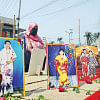Trade unions surge, but workers' rights still unprotected

The number of trade unions in the garment sector of Bangladesh has surged since the Rana Plaza building collapse though most of them are failing to live up to expectations when it comes to protecting workers' rights.
Following the nation's deadliest industrial incident on this day in 2013, which killed more than 1,130 workers and left 2,500 injured, the rules for registering trade unions were eased as the country came under immense international pressure to act, paving the way for setting up unions in the apparel sector.
Consequently, the number of trade unions in the industry climbed to nearly 1,300 from 250 in the pre-Rana Plaza period.
Read more articles on the tragedy HERE
Still, nearly 70 percent of about 4,000 garment factories in the country don't have registered trade unions. These industrial units have participation committees that may carry out activities related to the interests of workers until a trade union is formed.
Since allowing trade unionism is important for establishing a healthy industrial relation in any sector, the labour law was amended twice to simplify the rules linked to the freedom of association and the collective bargaining.
Bangladesh has also ratified all of the core conventions of the International Labour Organisation (ILO), guaranteeing the freedom of association and the right to collective bargaining.
Although trade unions have boomed over the years, their efficacy has not improved either due to pressure from factories or their inefficiency in running them, according to some union leaders.
Nazma Akter, a union leader in the garment sector for more than 35 years and now the president of the Sammilito Garment Sramik Federation, said most of the unions are either biased toward factory owners or the officials of the Department of Labour.
"So, they can't function independently. Moreover, some leaders don't understand unionism at all."
Syed Sultan Uddin Ahmmed, executive director of the Bangladesh Institute of Labour Studies, said few unions have the bargaining capacity.
"If unions don't have the bargaining power, they become platforms without any functionality."
He also criticised the unions that don't have the negotiating capacity, emerged as mere clubs and are not playing any effective role in the largest foreign currency earning sector.
Amid pressure from international retailers and brands and the international community, many garment factory owners have helped their loyal workers constitute unions, according to Ahmmed.
Md Towhidur Rahman, president of the Bangladesh Apparels Workers Federation, described the quality of unions in the garment sector as poor.
"So, most of the unions don't have the bargaining capacity. However, the main attraction of unions is whether it has the bargaining power or not."
Rahman urged the government to incorporate relaxed provisions in the labour law during its next amendment to ensure that unions function well.
He acknowledged that workplace safety in the garment sector has improved a lot because of the pressure from the international community in the past one decade.
Although Bangladesh now has a much higher number of trade unions in the key sector compared to the pre-Rana Plaza era, establishing such associations is still not easy.
The labour law stipulates that workers interested in setting up a union will have to collect the signatures of 20 percent of their fellow workers to form an association.
Sometimes, government officials attach conditions that are difficult to meet when it comes to registering unions, so workers feel discouraged, Nazma Akter alleges.
Mohammad Hatem, executive president of the Bangladesh Knitwear Manufacturers and Exporters Association, said most union leaders don't have even relations with the factory-level workers.
"After the formation of the unions, the leaders don't maintain communication with the workers. So, whenever there is any crisis, the roles of union leaders remain insignificant."
The entrepreneur cited the case of Vietnam where top-level government officials such as even a deputy prime minister become the central leader of trade unions.
The nature of trade unions is different is different in Bangladesh. On many occasions, trade unions can't be controlled properly because of the poor leadership, Hatem said.

 For all latest news, follow The Daily Star's Google News channel.
For all latest news, follow The Daily Star's Google News channel. 








Comments